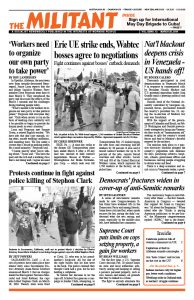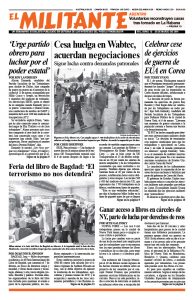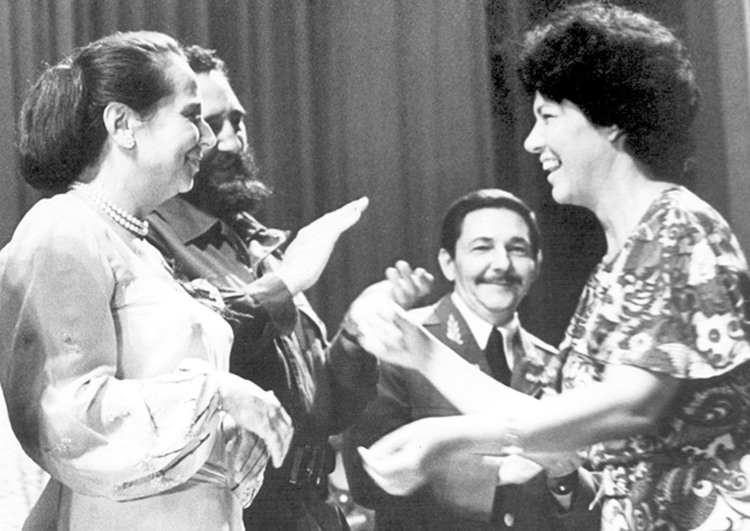The excerpt below is from Women in Cuba:The Making of a Revolution Within the Revolution by three leaders of the Federation of Cuban Women, Vilma Espín, Asela de los Santos and Yolander Ferrer. It is one of Pathfinder’s Books of the Month for March. The extract is from the chapter “It Gave Us a Sense of Worth,” an interview by Mary-Alice Waters with de los Santos. This book, subtitled From Santiago de Cuba and the Rebel Army to the Birth of the Federation of Cuban Women, is featured here to mark both Women’s History Month and the 60th anniversary of the Cuban Revolution. Copyright © 2012 by Pathfinder Press. Reprinted by permission.
ASELA DE LOS SANTOS: Cuban women have a tradition of struggle, from the mambises in the nineteenth century wars of independence to today. That tradition is an important political element in our socialist revolution.
With a historical leap, we find ourselves in 1953, the beginning of the struggle for genuine independence — I’m referring here to the attack on Moncada — and the heroic examples of Melba Hernández and Haydée Santamaría, who participated in that action.
As the struggle continued, more and more women became part of it.
Fidel’s course of building a mass revolutionary movement capable of sustaining and supporting the armed struggle enabled both men and women to be integrated.
Women joined the ranks of the Rebel Army. In the Sierra Maestra there was a platoon of women fighters known as the Marianas, named after Mariana Grajales, the mother of the eight Maceo brothers, all of whom fought for independence from Spain. She was one of the great heroes of the war for independence.
In the underground we did whatever was necessary. We sewed uniforms and armbands for the Rebel Army. We helped provide cover for moving weapons and young combatants. We found families who would house revolutionary fighters who had gone underground. We secured medicine. We served as messengers between different revolutionary fronts. We distributed subversive propaganda and collected supplies.
In short, women worked on every front in the underground struggle. …
As the struggle deepened, women saw greater possibilities opening up. There were many important things to do. The revolution offered them this opportunity. And I’m talking about even before the victory.
When a deepgoing revolution takes place, women, who have been oppressed for centuries, for millennia, want to take part.
You asked me if working in the underground was a liberating experience for a woman. Yes, it was. No one could stop the women.
WATERS: It gave you a sense of worth …
DE LOS SANTOS: … of worth as a human being, as part of the people.
WATERS: For me this is a very significant element of the Cuban Revolution. Your generation in Cuba was in the vanguard of the historic changes in women’s economic and social status, as we were drawn out of the home and into social labor to a previously unprecedented degree, something that began during the Second World War.
In no other socialist revolution have there been so many leaders who were women: Vilma Espín, Celia Sánchez, Haydée Santamaría, Melba Hernández, to name but a few of the best known. Their leadership was indispensable. It’s one of the elements of Cuba’s revolutionary history that needs to be better known and better understood. …
DE LOS SANTOS: In History Will Absolve Me, Fidel denounced the existence in Cuba of widespread illiteracy. Illiteracy is a tool in the hands of the exploiters. If you are ignorant, if you don’t know how to read or write, you’re not free. Not knowing even how to sign your name makes people feel inferior.
The rural population in the Second Front was poor, exploited, hungry. Many young people joined the Rebel Army, so the number of combatants who were illiterate grew. And this was a challenge.
That’s how the education effort started. Raúl issued orders that we teach all these young combatants to read and write. …
After the victory of the revolution, Raúl told all these teachers, all those young women from the Second Front, that they would be given scholarships to continue their education. And all those who wanted to remain teachers could do so.
In 1961 we launched a literacy campaign across the country. Before the revolution, 23 percent of the population was illiterate — more than 40 percent in the countryside. The goal was to eliminate this backwardness in a single year. The experience in the Second Front was a big help in the nationwide campaign. The campaign to wipe out illiteracy ended with a gigantic scholarship program that gave all young people continued access to study at higher levels. …
There was a growing consciousness among women, as well as in the leadership of the revolution, that it was necessary to organize a women’s movement. It was necessary to do political work among women, because they were at the bottom, the most exploited. We didn’t speak in terms of women’s equality at that time. We talked about women being housewives, confined to work in the home, overlooked and discriminated against. We talked about the need to integrate women into society and the workplace. …
Vilma stressed the need to incorporate the revolutionary capacities of women in the work of building a new society — a source of strength that was very important.
At the same time, the unfolding revolution itself increasingly helped women grasp their place in it. It helped them develop a consciousness of the need to take part in socially useful work outside the home. It helped them develop a consciousness that they had as many rights as men.
The federation set itself the goal of defending women, without bringing on a confrontation with men.


